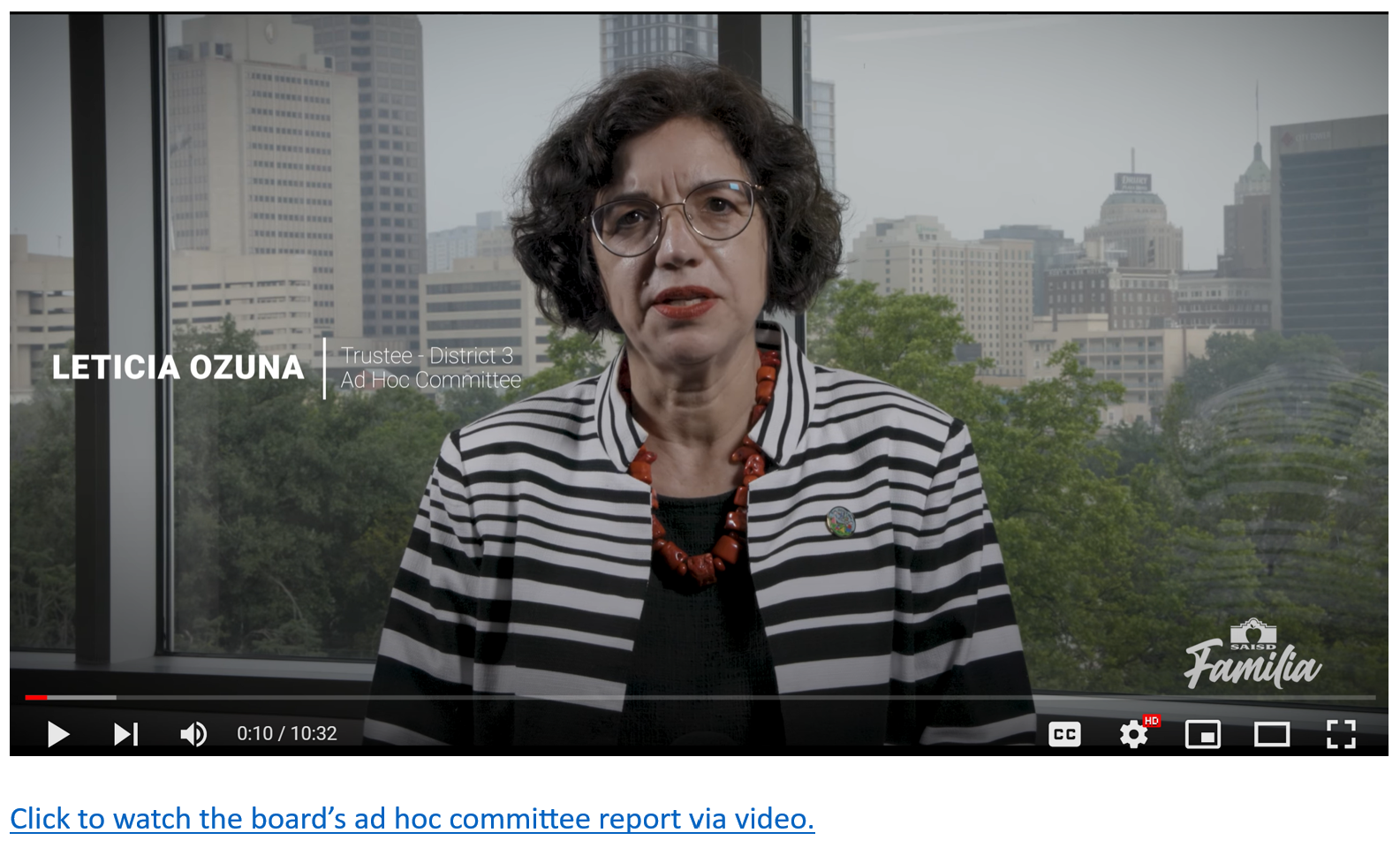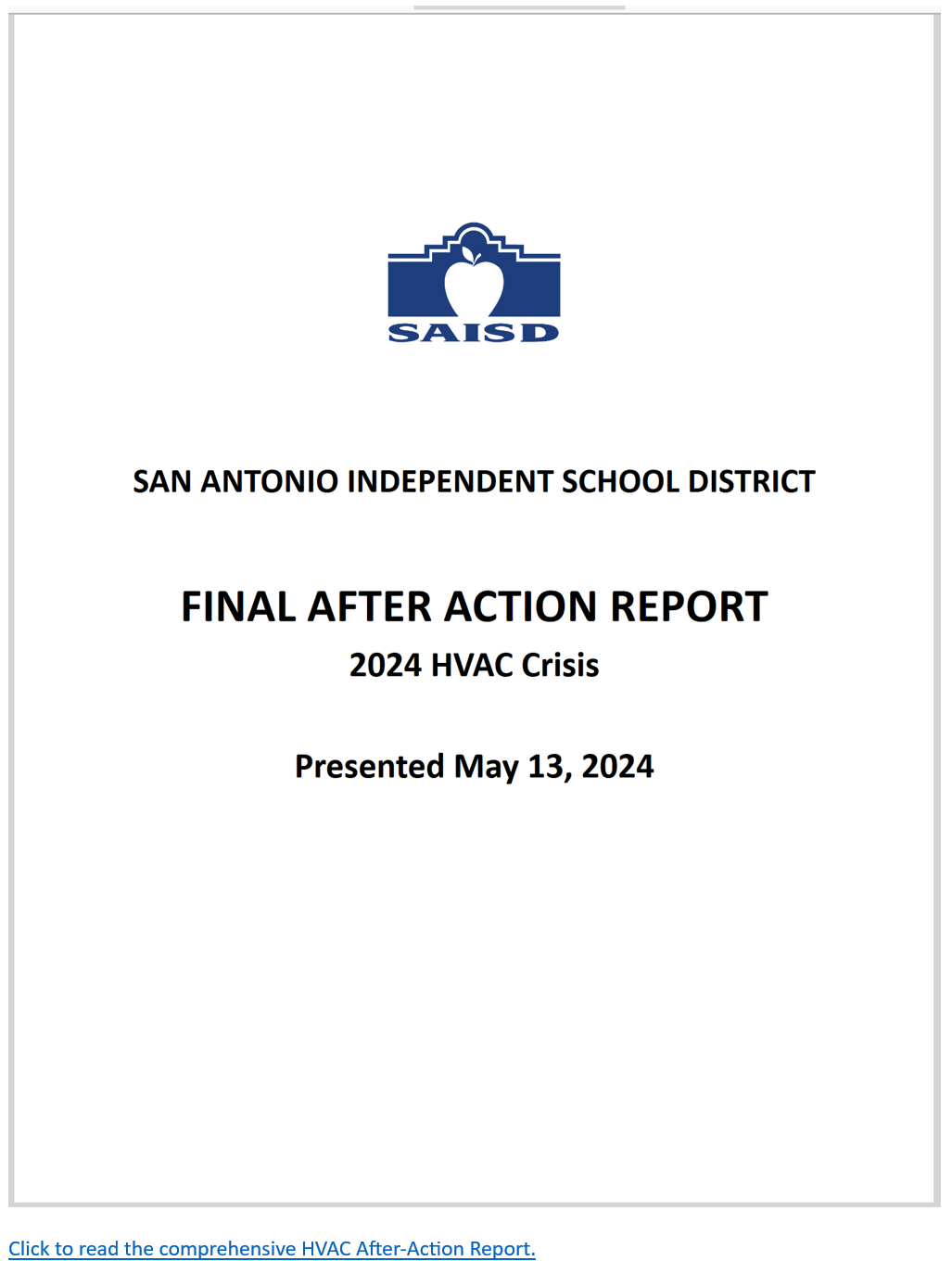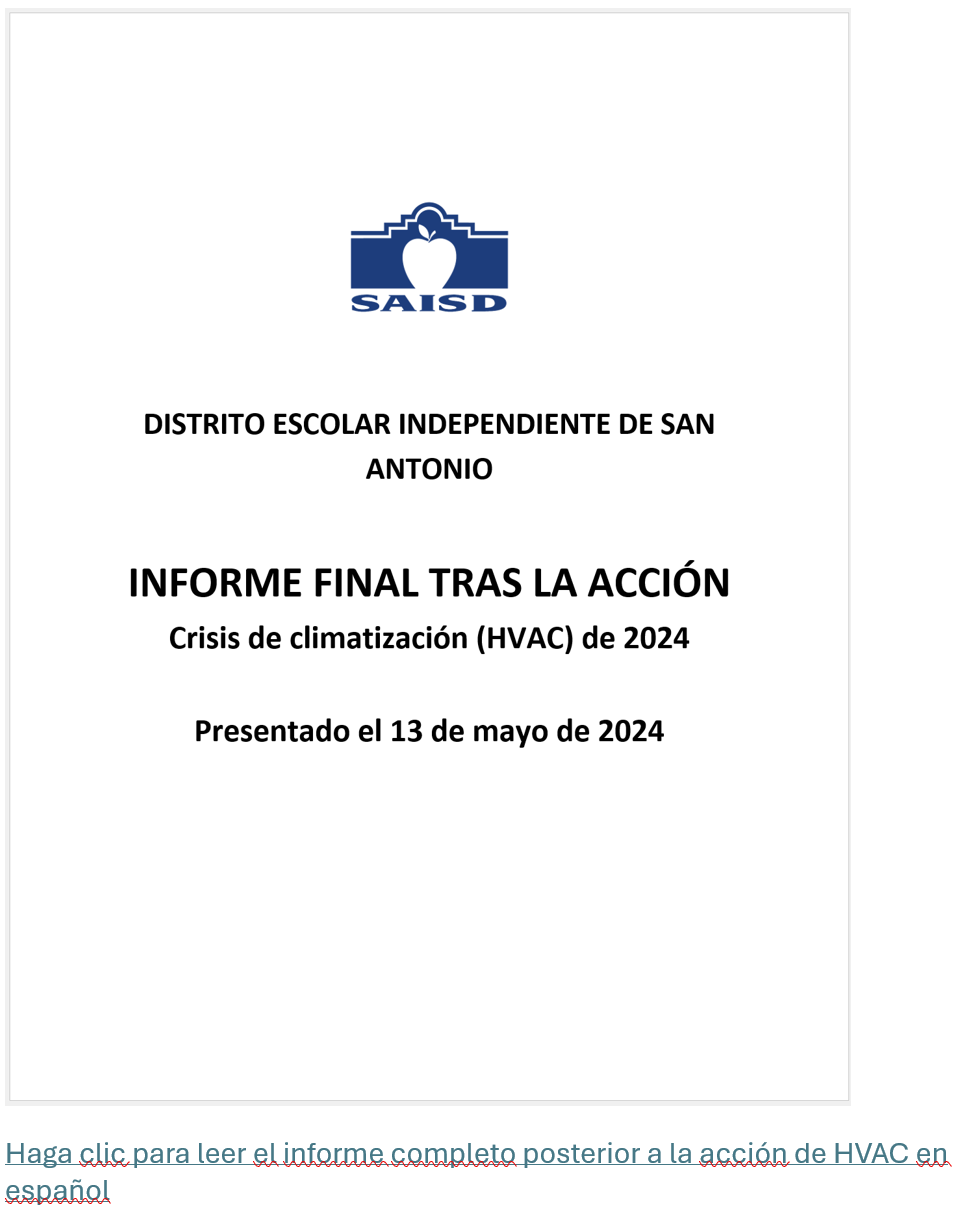
May 13
, 2024 – The San Antonio ISD Board of Trustees tonight discussed and accepted an after-action report that detailed the challenges the district experienced following a hard freeze in mid-January, following the Martin Luther King Jr. holiday. The challenges had forced the district to close all schools Jan.18-19.
The report includes the findings of the board’s ad hoc committee, charged with reviewing the incident and making recommendations in line with its role as a governing body. Trustee Leticia Ozuna chaired the ad hoc committee, which comprised Trustee Ed Garza, Trustee Stephanie Torres, and Bill Avila as committee members.
“This after-action report is part of the typical, robust management process of peer review, and it is similar to how we address other major events and activities in the district,” said Ozuna. “The ad hoc committee examined the crisis from three perspectives related to our governing role, including policy, finance, and superintendent accountability. Tonight, we put forth recommendations that will become board policies, which will hold the current, as well as future administrations, accountable based on unequivocal, metric-driven goals.”

The ad hoc committee’s review and findings was the fourth phase of the district’s comprehensive after-action plan. The four phases included the following actions:
•
Phase one: The Executive Team gathered insight and reflections to quickly stabilize operations and begin organizing a recovery plan. This was completed Jan. 30.
•
Phase Two: District staff led an assessment to prepare a basic knowledge base for external investigators and to continue organizing the recovery plan. This was completed Feb. 28.
•
Phase Three: The Texas Association of School Business Officials (TASBO) conducted an independent review to validate the Phase Two knowledge base and offer recommendations based on industry best practices. This was completed March 27.
•
Phase Four: The board’s ad hoc committee reviewed factors – including facility conditions, policy conditions, policy commitments, and bond investments – that contributed to the crisis. The members incorporated feedback from the external investigation and then determined their findings and recommendations. This was completed with tonight’s board action on May 13.

In the report, board and district acknowledge that the HVAC issue did not arise overnight, but rather evolved over decades. They resolved that the result of the incident was multiple layers of human error occurring over the last 20 years. This included the following errors.
•
The district did not adequately prepare for the weather event or develop an agile crisis management response once schools began reporting heating outages.
•
The district did not budget for ongoing equipment maintenance.
•
The district did not budget for professional development of full-time staff.
•
The district did not adequately maintain the complex system of heating and cooling hardware in its schools.
•
The district did not make systemic or consistent use of its work-ordering and inventory systems, or routinely check the quality of work reported complete.
The report also states that, in past bond elections, there was not always a rigorous application of reliable, industry-standard data used to guide and align decisions about the implementation of building improvement plans. Nor did the district make consistent use of reliable performance data or key performance indicators to determine that maintenance and repair activities were requested or completed, or whether buildings were ready to operate.
Additionally, the report indicates that the ad hoc committee kept in mind two underlying causes during its review. These underlying causes included the underfunding of Texas public schools and the large number of aging buildings the district operates.
The report addressed the number of buildings it must maintain as it relates to the district’s student enrollment. Despite declining enrollment, the report acknowledged the hesitation the district and community have had to consolidate schools. For instance, in 2009, the district considered closing up to 30 schools, but only closed nine. In 2023, the district proposed closing 19 schools, but only closed 15. Consequently, the report stated, expenditure per square footage falls below the national average.
“Our rightsizing decision in November 2023 will partially mitigate this problem in the future,” said Ozuna.
Upon considering the facts and circumstances, Ozuna said the ad hoc committee made eight conclusions and recommendations and included them in the after-action report. These recommendations, in no priority order, include the following:
•
The Board of Trustees shall instruct the Superintendent to conduct a comprehensive study of excess facility capacity in San Antonio ISD’s school buildings by November 2025. This study will evaluate staffing levels, programming, and maintenance conditions at each school to ensure alignment with Always Learning, the district’s strategic management plan, and a thriving educational program. Recommendations for rightsizing schools, academic programs, and central office capacity will be included, aiming to rectify resource disparities between schools and enhance opportunities for all students to attend high-quality schools.
•
The Board of Trustees shall adopt a policy stating that all future bonds and referendums will include an investment in school facility infrastructure that is based on reliable external data obtained from a facilities conditions assessment conducted by an independent third party with expertise in school facility management. Further, the policy shall state this infrastructure investment requirement cannot be overridden by Trustees or administration during the design or construction phases of the work should the proposition be approved by the voters.
•
The Board of Trustees shall require that 5% of any future bond be dedicated to investing in deferred maintenance on its school facilities until such time as there is no longer any deferred maintenance on its school facilities.
•
The Board of Trustees shall collaborate with the Superintendent to revise Board Guardrail 3, which expresses values on school safety, to include a measurable interim guardrail that focuses on the environment for high-quality instruction to be acted on by the board no later than its July 2024 meeting.
•
Within the next 12 months, the district shall bring to the Board of Trustees a procurement request for the purchase and effective implementation of enterprise systems such as a computerized maintenance management system and building automation systems, which include HVAC controls. This system will provide real-time, standardized, and comprehensive data on HVAC hardware across all school facilities, as well as accurate records of maintenance and repair activities for all HVAC equipment. It will also include features such as asset tracking, maintenance performance data, and integrated preventive planning schedules. In the interim, at the direction of the Superintendent, the district shall establish and maintain an accurate inventory of critical infrastructure assets, to begin immediately and to continue until the facilities conditions assessment is complete.
•
At the direction of the Superintendent, the Deputy Superintendent for Operations shall establish by June 2024 a set of Key Performance Indicators that are predictive of the readiness of school facilities to operate, especially under inclement weather conditions. (this will be presented at the June 24th Board Meeting)
•
At the direction of the Superintendent, the district shall adopt by August 2024 administrative procedures for disaster recovery and business continuity based on national, best practice models in the K-12 sector.
•
At the direction of the Superintendent, the district shall complete by November 2024 a market study of the total compensation and benefits packages for HVAC and other operations professionals in Texas and include in its budget a plan that will bring the total compensation package for its HVAC and other operations professionals in alignment with the statewide market, in the context of increasing total compensation for all San Antonio ISD employees.
As the ad hoc committee members worked on and completed the after-action report, they said they were fully aware that the community needs to have confidence in the board’s stewardship, and in the integrity of the administration and bond programs.
“We commit to leading with openness and a strategic, systemic approach to tackling our challenges,” Ozuna said. “We want our families to feel reassured that the board will push all leaders to do better for our students.”
The ad hoc committee members indicated that they believed the district, and every system in which it operates, shares responsibility.
“By all leaders, we also mean this collectively to include district, city, state, and federal leaders,” Ozuna said. “In the end, it is not about a broken HVAC system. It is about ensuring we have good learning environments for all students.”
The after-action report is publicly available on the district’s website.